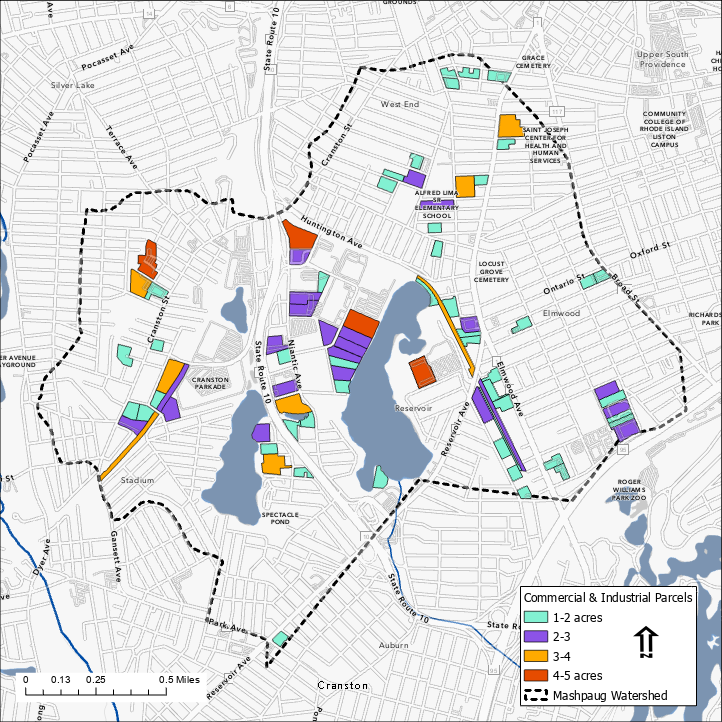'A major win for residents': How businesses near Mashapaug Pond will have to control runoff
PROVIDENCE – Some 70 businesses in Cranston and Providence will be required to clear out catch basins, sweep parking lots and clean up leaf litter as part of a state-mandated plan to control stormwater runoff in a bid to prevent toxic algae blooms in the Mashapaug Pond watershed.
Those measures are among the actions that businesses around Mashapaug, Spectacle and Tongue ponds will have to take after the state Department of Environmental Management approved, as expected, a petition that aims to stamp out nutrient-fueled blooms of cyanobacteria that pose a health threat to humans and animals.
The DEM released its decision in a letter Monday to the Office of Attorney General Peter Neronha and the Conservation Law Foundation, the two entities that separately petitioned the agency to force businesses to control runoff from rain and snowmelt that washes bacteria, phosphorous, oils, heavy metals and other pollutants into the watershed and have forced the closure of one or more of the ponds 20 times since 2011.
“DEM is taking this step to clean up an important urban watershed and protect public health by putting property owners on a path and on the clock to reducing pollutant loads,” Terry Gray, director of the agency, said in a statement. “We are confident that that by regulating allowable activities and giving guidance to site owners on how to meet the permit requirements, the problems plaguing the Mashapaug watershed will be fixed in time.”
Approval of efforts to clean up runoff in Mashapaug watershed was expected
At a news conference in January where the petition was announced, Gray said his agency was fully supportive of cleaning up the watershed that flows into Narragansett Bay and had already decided to move forward with a stormwater management plan in the area.
The businesses that are being targeted were all built before the implementation of state stormwater regulations in 1993, meaning they’re not currently required to prevent runoff from entering the ponds.
They are being forced to take corrective action through a rarely used clause in the federal Clean Water Act known as “residual designation authority” that has also been invoked by the U.S. Environmental Protection Agency in Boston to regulate previously unpermitted discharges into the Charles, Mystic and Neponset river watersheds.

The effort to reduce pollutants in the Mashapaug watershed is the first time such authority is being used by the DEM, which enforces the Clean Water Act in Rhode Island. The work is being modeled on what’s been done in Boston.
Frequent closures of ponds hit by toxic algae blooms
Since at least 1998, Mashapaug and Spectacle ponds have been on the state’s list of impaired waters. Blooms of cyanobacteria, or blue-green algae, which plague the two ponds, as well as Tongue Pond, reduce oxygen levels and produce toxins that can kill fish, mammals and birds and cause illness in humans and death in extreme cases. Closures of the ponds for algae blooms that prohibit recreational use by the public can last for months.
All three ponds are located in a heavily urbanized environmental justice area that is disproportionately burdened by pollution.
The new stormwater permit being drawn up by the DEM will affect industrial, institutional and commercial properties in the watershed with at least one acre of impervious surface, such as concrete or asphalt.
Sweeping parking lots, clearing storm drains to be required
Within the first year of the five-year permit, businesses will be required to develop a stormwater management plan that will reduce or eliminate discharges or pollutants into the watershed. As part of their planning, they will have to consider building rain gardens, retention ponds and other types of so-called green infrastructure. They will also have to look at addressing the impacts of flooding from downpours that are becoming more frequent with climate change.
More: 'We're serious': AG's office, DEM using a new approach to protect RI watersheds
By the second year, the businesses will be required to start sweeping up parking lots twice a year and cleaning out storm drains.
The DEM said in the letter signed by Gray that it expects to develop a draft permit by late summer to share with stakeholders, will put it out to formal public notice in the fall, and aims to issue a final permit by the end of the calendar year.
Darrell Brown, vice president of CLF in Rhode Island, called the DEM’s decision a “major win for residents.”
“For the first time in decades, these water bodies will have a chance to recover and once again be safe places for boating, swimming and fishing,” he said in a statement. “We hope that one day, instead of being a toxic hazard, Mashapaug Pond will become a great community asset.”
This article originally appeared on The Providence Journal: RI will force dozens of businesses to control stormwater runoff

